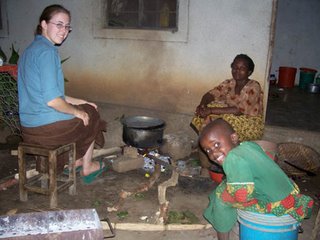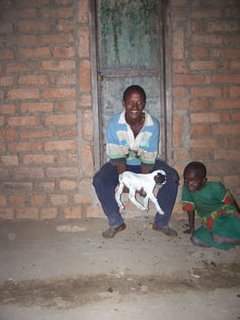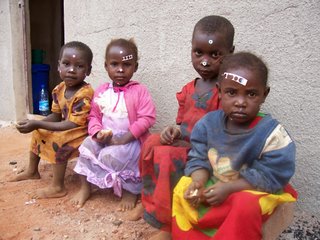As many of you already know, we have been hit pretty hard emotionally this last month as we've learned the challenges faced by the people living in our village. The Dodoma region (which is typically characterized by a rainfall season of 300-500 mm over several months followed by a longer completely dry season) has suffered several droughts recently. Last year was a particularly difficult one, with the rains coming late and lasting only briefly. Since everyone in our village lives mostly by farming, this was a very serious catastrophe. We are now approaching the end of the long dry season. The water source for our village (a spring several miles away in the mountains that has been tapped to flow down to several villages in rotation throughout the week) is drying up, and so each day is a new struggle for people to find food and water for their families.
In brief, following are the key problems we have identified through observations and conversations (in Kiswahili, at which we are trying our best!).
1. SEEDS Because harvests were lost, people were not able to save seeds. In some cases, such as peanuts, an important cash crop, the seeds have been eaten by families seeking to survive in the short run. And of course incomes were much lower than normal, so they can't easily buy seeds either. This is a sad problem created by the droughts: seeds will be a problem this year whether rains come on time or not.
2. SCHOOLS The secondary school is just getting started, with only it's first class of students in attendance. Unfortunately, students have stopped being able to pay their fees, and began to be turned away just after James and I arrived.
Students at the primary school are luckier, because the government requires them to receive an education whether they pay fees or not. Our village's school has tried to ask each student to pay 100 shillings (less than 10 cents) each month, but has received little to none. So the school is run using the government salaries of its teachers and facilities that are in most ways either dilapidated or cramped (although it has received aid to build 2 new classrooms beginning after the rainy season). The primary school teachers have identified the following priorities for their school: housing for teachers (These are old buildings, in some cases originally intended for grain storage, with huge cracks in the cement. In one case the teachers worked together to fill in a large gap with mud where the wall is falling away from the building.); an office (all 7 teachers share one narrow cramped room) and 2 more classrooms in addition to the two currently planned; food (in other areas one meal a day of uji [gruel] is offered) for students, many of whom don't come to school or can't learn because of hunger; and a tank to harvest rain water off the roof for teachers' use and for a school garden in the dry season. This last one is an ideal Peace Corps project, which we hope to apply for funding for soon, although tank construction can't begin until after this rainy season. We'll let you know how you could help this project through the Partnership Program for grant funding once it's underway.
3. WATER This is pretty much everyone in the village's number one priority, but it is still unclear to us how much we can do within the scale of a Peace Corps project. We're looking into water conserving gardening projects and cheap, simple technologies for harvesting rainwater. Some surveying work has been done by engineers looking into tapping an additional spring or building a small pond to catch rainwater runoff from a nearby mountain. We may be able to work with other organizations to keep those ideas moving.
4. DEFORESTATION This is a big problem directly related to the low water table and quite possibly decreasing rainfall. Wood is a scarce resource that is in high demand for fuel and construction. We hope to target both conservation and replanting. Recently a villager who was trained in construction of fuel efficient stoves helped us build one in front of our house as a demonstration. We will be trying it for the first time when we get back.
5. VULNERABLE COMMUNITY MEMBERS We are just starting to understand the situations of orphans and elderly persons without a responsible adult child to assist them. We know that they face even greater problems of access to water, food, clothing, housing, bedding, education, love, and care, and we are looking for ways to work together with other villagers to address these problems.
6. OTHER MISCELLANEOUS training in animal (chickens, cows, pigs, goats) care, small business start-up assistance, family planning, women's health, nutrition, and HIV/AIDS education.
Some of these lend themselves easily to Peace Corps projects James and I can start, and others do not. We are trying to prepare to be as effective, helpful, and empowering of others as possible. We were initially overwhelmed by the poverty in our village, and I think to live here responsibly we will always be mourning the injustice of so much hunger and vulnerability to the elements faced by people in this particular corner of the world. However, living here will become much easier once we are more actively engaged each day with our neighbors in work to make things better.
On a related note, we went to our first funeral in the village last week. It was for the 18 month old son of a friend of ours, a man whose teenage daughters sometimes study using the dictionaries at our house in the evenings and who we are paying to make small desks for this purpose and also other furniture. All we know is that the child was sick with a very high fever for 24 hours, was taken to the hospital in the nearest city and died there. Sounds like malaria, but there are no mosquitos here. The common consensus at the funeral was that this was "mpango wa Mungu, " the plan of God. My personal thoughts on this are that while suffering is unquestionably part of the role of humans on earth, it is in no way God's plan that we should simply accept such unequal suffering as currently exists. Therefore I can not accept that it was God's plan that I should never personally known a single baby to die in 24 years of living in the United States and have met one of what presumably will be many in only one month living here.)




